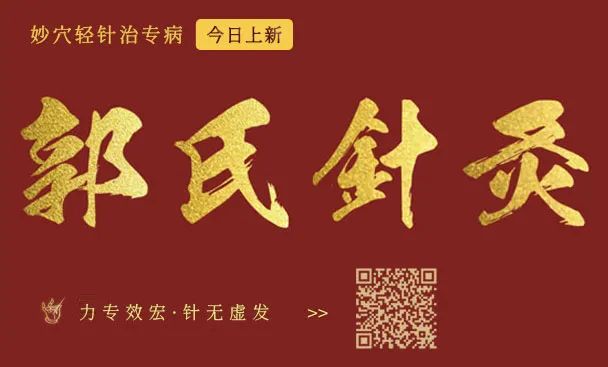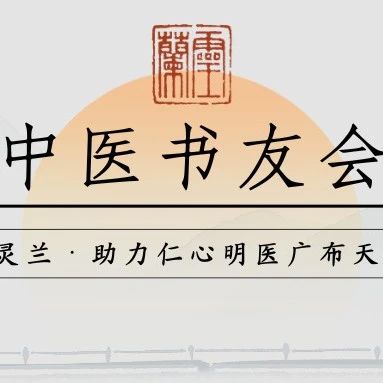
Chinese Medicine Book Club Issue 2477
Daily updates to accompany the growth of TCM practitioners
AuthorIntroduction:The basic pathogenesis of hiccup (呃逆, é nì) is the upward rebellion of stomach qi (胃气, wèi qì) and obstruction of diaphragm qi (膈气, gé qì). This condition often starts with excess and can lead to deficiency if prolonged. It is commonly caused by cold, heat, stagnation, phlegm, or deficiency of righteous qi (正气, zhèng qì). The patient in this case experienced complications from excessive moxibustion (艾灸, ài jiǔ) during the summer, resulting in a complex condition with multiple symptoms. Clinical differentiation and treatment were quite challenging, and I will share my experience in treating this patient for the benefit of readers. It also serves as a reminder that moxibustion should be applied judiciously and not overused.(Editor/Qian Cheng)

Case Study: Treatment of Hiccup After Moxibustion with Huanglian Decoction
Author/Zhou Jiacheng, Supervisor/Wang Dongxu
The patient, Sun, a 42-year-old female, presented with hiccup (呃逆, é nì) accompanied by intermittent palpitations for over six months, first diagnosed on March 4, 2019. The patient reported that after two months of moxibustion last summer, she began experiencing frequent hiccups, palpitations, and chest tightness. She described a sensation of unease in her heart, feeling depressed. In the evening, she felt heat in her palms and soles, dry and peeling lips, swollen upper lip, and five hearts (五心, wǔ xīn) feeling hot. She experienced abdominal pain when consuming cold drinks, which exacerbated her hiccups.
Over the past six months, the patient visited the hospital multiple times, undergoing various tests including blood routine, 13-C urea breath test, fasting blood glucose, myocardial enzyme profile, thyroid function tests, 24-hour dynamic electrocardiogram, gastroscopy, and thyroid ultrasound, all showing no significant abnormalities. A breast ultrasound indicated: 1. Bilateral breast hyperplasia. 2. Left breast duct dilation, BI-RADS category 2. After treatment with oral beta-blockers and Chinese medicine, her symptoms did not improve significantly, leading her to seek consultation in our department. Currently: normal urination and defecation, restless sleep, and dry cough after falling asleep. The tongue is pale and tender, with a red tip, and the pulse is slippery. The patient has a history of chronic gastritis.
The patient was diagnosed with hiccup due to excessive summer moxibustion, resulting in the invasion of “fire toxin” (火毒, huǒ dú) and depletion of heart and spleen yang (心脾之阳, xīn pí zhī yáng).
Diagnosis: Hiccup with mixed cold and heat syndrome.
Prescription: Modified Huanglian Decoction (黄连汤, Huánglián Tāng).
Ingredients: Jiang Bansha (Ginger Processed Pinellia) 9g, Huanglian (Coptis) 3g, Jiao Zhizi (Fried Gardenia) 9g, Guizhi (Cinnamon Twig) 6g, Fuling (Poria) 30g, Zhi Gan Cao (Honey-Fried Licorice) 6g, Dazao (Jujube) 9g, Gualou Pi (Trichosanthes Peel) 10g, Zhike (Bitter Orange) 10g, Jiegeng (Platycodon) 6g, Xianhecao (Agrimonia) 30g, Xingren (Apricot Kernel) 6g, Baiziren (Biota Seed) 10g, Suanzaoren (Sour Jujube Seed) 10g, Sheng Longgu (Raw Dragon Bone, pre-boiled) 15g, Sheng Muli (Raw Oyster Shell, pre-boiled) 15g, Houpo (Magnolia Bark) 9g. 7 doses, decocted in water, one dose per day, taken twice daily.
On March 11, 2019, during the follow-up, the patient’s hiccup symptoms had significantly improved, but she still felt chest tightness and palpitations, was still feeling depressed, and experienced improved sleep, but still felt feverish in the evening, especially at night. She felt fatigued with poor appetite, dry mouth, dry nose, and burning pain in the nasal passages, with peeling lips. The tongue is tender, with a red tip, slightly greasy coating, and the pulse is wiry and slippery. Prescription: Add Taizishen (Pseudostellaria) 10g, Dan Dou Chi (Fermented Soybean) 9g, Sangye (Mulberry Leaf) 15g, and Pipa Ye (Loquat Leaf) 10g to the March 4 formula. 7 doses, decocted in water, one dose per day, taken twice daily.
On March 18, during the third follow-up: the patient’s symptoms had greatly improved, hiccup symptoms had disappeared, sleep improved, and evening fever symptoms had resolved. She still felt dryness and discomfort in the throat, but no other significant discomfort, appetite improved, and normal urination and defecation. The tongue is tender, with a slightly red tip, thin white coating, and the pulse is wiry. The prescription for March 11 was modified to include Chaihu (Bupleurum) 9g and Baishao (White Peony) 6g. 7 doses, decocted in water, one dose per day, taken twice daily.
Discussion
The patient was misled by the exaggerated claims of a moxibustion clinic regarding the TCM theory of “nurturing yang in spring and summer” for preventive health, and underwent moxibustion for over two months in the summer of 2018. Due to her underlying deficiency, and the pure yang nature of moxibustion, “fire cannot coexist with original qi (元气, yuán qì)”, excessive fire consumes qi, and the heat pathogen damages heart and spleen yang, depleting the body’s original qi, leading to the dispersion of yang qi externally.
“When yang is insufficient, yin follows.” With insufficient heart and spleen yang, yin pathogens invade, leading to an internal conflict of yin and yang, resulting in a mixed cold and heat syndrome with both deficiency and excess.
Additionally, previous treatments for “abdominal cold pain” mistakenly used warming and pungent herbs such as Dingxiang (Clove), Fuzi (Aconite), Paojiang (Processed Ginger), and Wuzhuyu (Evodia), which further dissipated yang qi, causing it to float and resist external influences. At night, the yang qi could not return to yin, resulting in significant fever. Insufficient heart yang led to upward surging of yin fire, causing palpitations resembling a “running piglet” (奔豚状, bēn tún zhuàng). Insufficient spleen yang caused the stomach to lose its harmony and descent, leading to hiccup. The patient experienced heat above and cold below, with fire not returning to the source, and the conflict of yin and yang internally resulted in abdominal pain, which worsened after consuming cold drinks. Over time, the patient became anxious and restless, feeling depressed, leading to liver qi stagnation, which transformed into fire, exacerbating the heat pathogen, scorching the upper jiao (上焦, shàng jiāo) and causing dry mouth and chapped lips.
The treatment principle should focus on gathering the floating yang, harmonizing the internal yin and yang, to restore the orderly ascent and descent of yin and yang, and harmonize the five organs.
As stated in the “Shang Han Lun” (伤寒论): “In cases of cold damage, if there is heat in the chest, evil qi in the stomach, abdominal pain, and a desire to vomit, Huanglian Decoction is the main treatment.” Huanglian Decoction harmonizes cold and heat, regulates the stomach, and descends rebellious qi. It can treat heat above and cold below, vomiting, and abdominal pain. It also states: “In cases of taiyang disease, after purging, if the pulse is rapid and the chest is full, Guizhi Decoction minus Baishao is the main treatment.” Guizhi Decoction minus Baishao can dispel yin and promote yang, treating the obstruction of chest yang and upward surging of qi.
As noted in the “Shang Han Lun Fang Jie”: “In taiyang syndrome, if the physician mistakenly administers purgatives after the symptoms of headache, fever, sweating, and aversion to wind have not resolved, and if there is no fullness or hardness in the heart area, and no pain upon palpation, but a sensation of qi surging up to the chest, with a tight and rapid pulse, the Fuling Xingren Gancao Decoction is a classic formula that can relieve chest obstruction and shortness of breath.
Zhang Xichun in “Yixue Zhongzhong Canxi Lu” once treated a case of palpitations with Dingxin Decoction, and I have taken the meaning of Dingxin Decoction, using the three herbs in the formula: Suanzaoren to nourish qi, Baiziren to nourish blood, and Shenglonggu to calm the spirit.
Guizhi can also harmonize the upward surging and descending of qi, and when combined with Xianhecao, it is commonly used in clinical practice to treat palpitations and anxiety. Additionally, Zhizi and Houpo Decoction can treat “irritability and abdominal fullness, restlessness upon rising and lying down.”
This formula primarily uses Huanglian Decoction, combined with Guizhi Decoction minus Baishao and Fuling Xingren Gancao Decoction, to achieve the function of harmonizing internal and external yin and yang. The formula employs Huanglian and Sheng Zhizi to clear heat from the chest, Guizhi to move qi, warming heart yang and dispelling cold from the middle jiao, Bansha and Houpo to harmonize the stomach and descend rebellious qi, thus balancing cold and heat, harmonizing the middle jiao, and restoring the normal ascent and descent of yin and yang, leading to the resolution of pain and vomiting. Fuling, Gualou Pi, Zhike, Jiegeng, and Xingren regulate qi and expand the chest, promoting the yang qi in the chest. Suanzaoren, Baiziren, Shenglonggu, and Xianhecao calm the spirit and stabilize palpitations, gathering the floating yang. Zhi Gan Cao and Dazao protect stomach qi and harmonize the other herbs. By the second follow-up, the hiccup had eased, and the yin and yang were in harmony, but the yin fluids were damaged, so Taizishen, Sangye, Pipa Ye, and Dan Dou Chi were added to clear dryness and nourish yin.
By the third follow-up, the patient had greatly recovered, and the original formula was continued with the addition of Chaihu and Baishao to soothe the liver and nourish blood.
Recommended Reading
We have developed a small formula for hiccup, choking, vomiting, and diarrhea.
Non-drug treatment methods for hiccup.
|
I Copyright Statement
I Submission Email [email protected] |
﹀
﹀
﹀
Recommended Courses
The Linglan and Guo’s Acupuncture Team systematically organizes the entire academic system of Guo’s acupuncture, deeply excavating the clinical experience accumulated over a century. The 2020 course “Miao Xue Qing Zhen Zhi Zhuan Bing” focuses on common diseases in three specialties: gynecology, pain syndromes, and hemiplegia, discussing the treatment ideas and acupuncture techniques developed over three generations of Guo’s acupuncture. This course can help you revitalize your TCM knowledge, quickly improve your acupuncture clinical skills, and ignite your passion for acupuncture.
-
To master the basics: The course includes a dedicated notebook with classic quotes from Guo and essential practice exercises; the course page has a learning guide to provide direction even for beginners.
-
To help you summarize and remember: Each episode of the course has corresponding knowledge point reviews, and there are Guo’s acupuncture songs to help you remember and apply, truly achieving “Needles in hand, formulas in mind”.
-
Online teacher-student interaction: The main instructor holds a live Q&A session once a month, along with sharing frontline clinical data.
-
Join us for mutual learning and progress: Participate in the Guo’s Acupuncture Alumni Association, discuss and exchange in the student group, and accumulate small progress through basic skill check-ins.
Long press the poster QR code to go to Linglan TCM for a trial.

↓↓ Read the original text for more student feedback.

